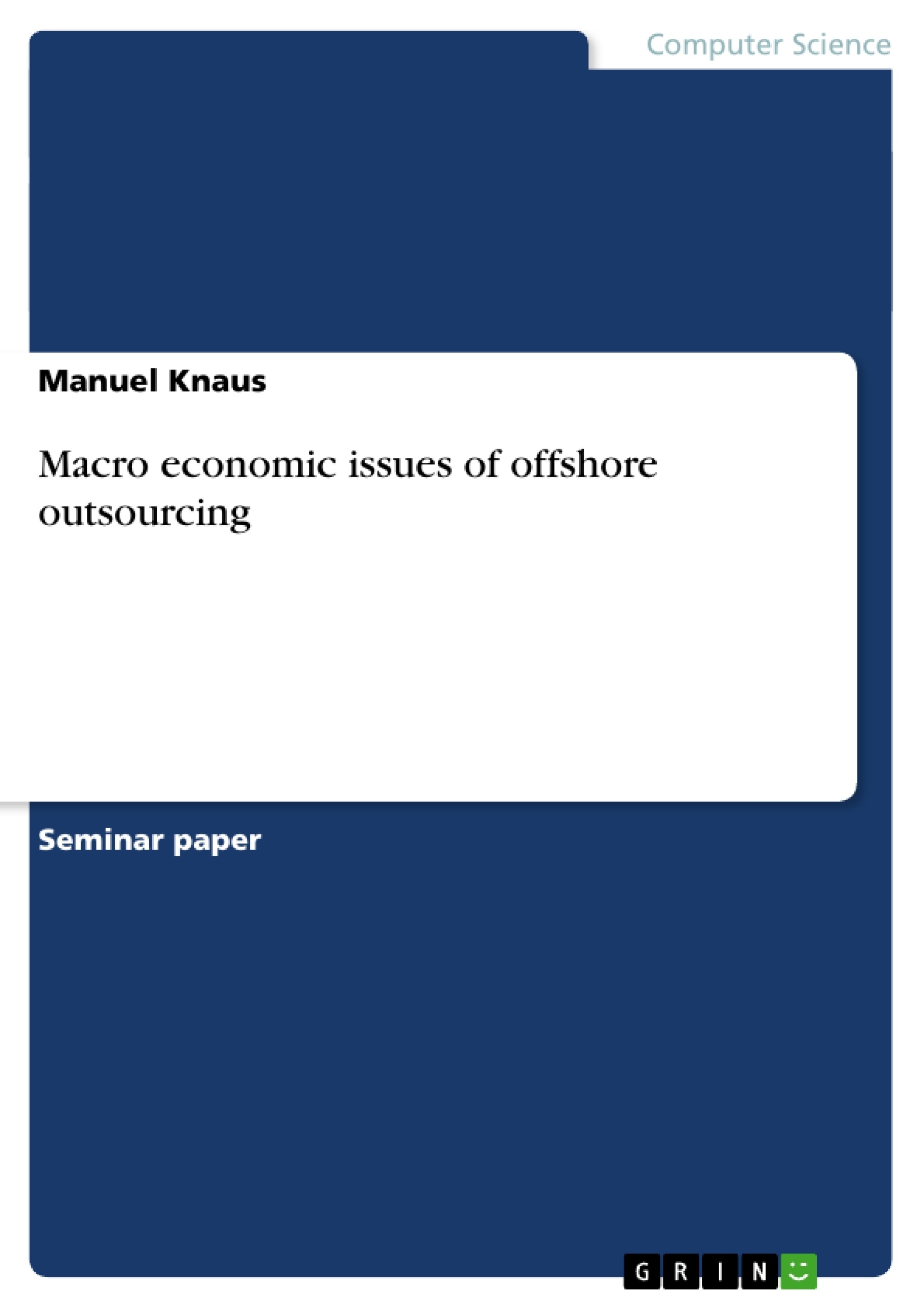Topic of this paper are the macro economic issues of offshore outsourcing.
First inland and offshore outsourcing are described, especially focused on IT outsourcing. Then reasons for IT offshore outsourcing are illustrated. Popular offshore markets are introduced and the advantages are shown.
In the next chapter, problems and risks of offshore outsourcing are explained. Both the more general view and IT specific problems and risks are described. Here general problems as well as problems of IT outsourcing are mentioned.
Then consequences of the offshoring trend are illustrated. Apart from consequences for IT branch, especially consequences for national economies of western countries, e.g. Germany, are viewed in detail. There can be short term and long term consequences. Future offshore outsourcing trends help to understand the effects. The development of unemployment caused by offshoring is one main focus. Furthermore offshoring trends in other white collar work besides IT are shortly described.
At the end this the paper develops an idea about possible solutions for western countries. Potential reactions of the government and suggestions on how to create new jobs are presented in detail. The paper finally ends with a small conclusion.
Inhaltsverzeichnis (Table of Contents)
- CONCEPTUAL INTRODUCTION
- Outsourcing..
- Outsourcing in offshore markets.
- IT outsourcing.
- REASONS FOR OFFSHORE OUTSOURCING...
- Advantages of offshore outsourcing
- Facts of some developing countries
- India
- Vietnam
- Russia
- China
- Middle and East European countries..
- Excellence or inferiority of the offshoring services.
- PROBLEMS WITH OFFSHORE OUTSOURCING.........
- Risks and problems of outsourcing.
- Problems in developing countries.
- Barriers between western and developing countries.
- CONSEQUENCES FOR WESTERN COUNTRIES..
- Current and future IT outsourcing trends...
- Consequences for the western IT branch
- Consequences for the national economy of Germany.
- Development of unemployment in western countries.
- Crossover of the offshoring trend towards other economic areas...
- POSSIBLE SOLUTIONS..
- Creation of new jobs
- Adjusting screw of macroeconomic parameters.
- Future of offshore outsourcing.
- CONCLUSION.......
Zielsetzung und Themenschwerpunkte (Objectives and Key Themes)
This paper aims to examine the macro-economic implications of offshore outsourcing, particularly within the IT sector. It delves into the reasons behind this trend, analyzing its advantages and disadvantages, and explores the potential consequences for both developing and Western countries.
- The definition and characteristics of offshore outsourcing, specifically in the IT industry.
- The advantages and disadvantages of offshore outsourcing for both businesses and economies.
- The potential risks and challenges associated with offshore outsourcing, including labor market dynamics and cultural differences.
- The impact of offshore outsourcing on the national economies of Western countries, particularly Germany, and the resulting effects on employment and competitiveness.
- Possible solutions and strategies to address the challenges posed by offshore outsourcing and mitigate its potential negative consequences.
Zusammenfassung der Kapitel (Chapter Summaries)
The first chapter provides a foundational understanding of outsourcing, differentiating between onshore and offshore outsourcing, and focusing specifically on IT outsourcing. The second chapter explores the driving forces behind offshore outsourcing, outlining its advantages and examining the specific circumstances and opportunities in various developing countries. The third chapter delves into the challenges and potential risks associated with offshore outsourcing, encompassing both general and IT-specific concerns.
Schlüsselwörter (Keywords)
The paper focuses on the macro-economic implications of offshore outsourcing, particularly in the IT sector. Key themes include outsourcing, offshore outsourcing, IT outsourcing, globalized labor markets, economic development, competitiveness, unemployment, and potential solutions to mitigate the challenges posed by this global trend.
Frequently Asked Questions
What is the difference between onshore and offshore outsourcing?
Onshore outsourcing involves hiring a service provider within the same country, while offshore outsourcing involves moving business processes or IT services to a provider in a distant country, often to reduce costs.
Why do companies choose IT offshore outsourcing?
The primary reasons are cost savings due to lower wages in developing countries, access to a larger pool of specialized talent, and the ability to operate 24/7 through different time zones.
Which countries are popular for offshore outsourcing?
Major offshore markets include India, China, Vietnam, Russia, and various Central and Eastern European countries.
What are the risks of offshore outsourcing?
Risks include cultural and language barriers, loss of control over quality, geopolitical instability in the provider's country, and potential negative impacts on the home country's labor market.
How does offshoring affect unemployment in Western countries?
In the short term, it can lead to job losses in specific sectors like IT or manufacturing. However, proponents argue it can lead to long-term economic growth by allowing companies to focus on high-value activities.
- Quote paper
- Manuel Knaus (Author), 2004, Macro economic issues of offshore outsourcing, Munich, GRIN Verlag, https://www.grin.com/document/31735



